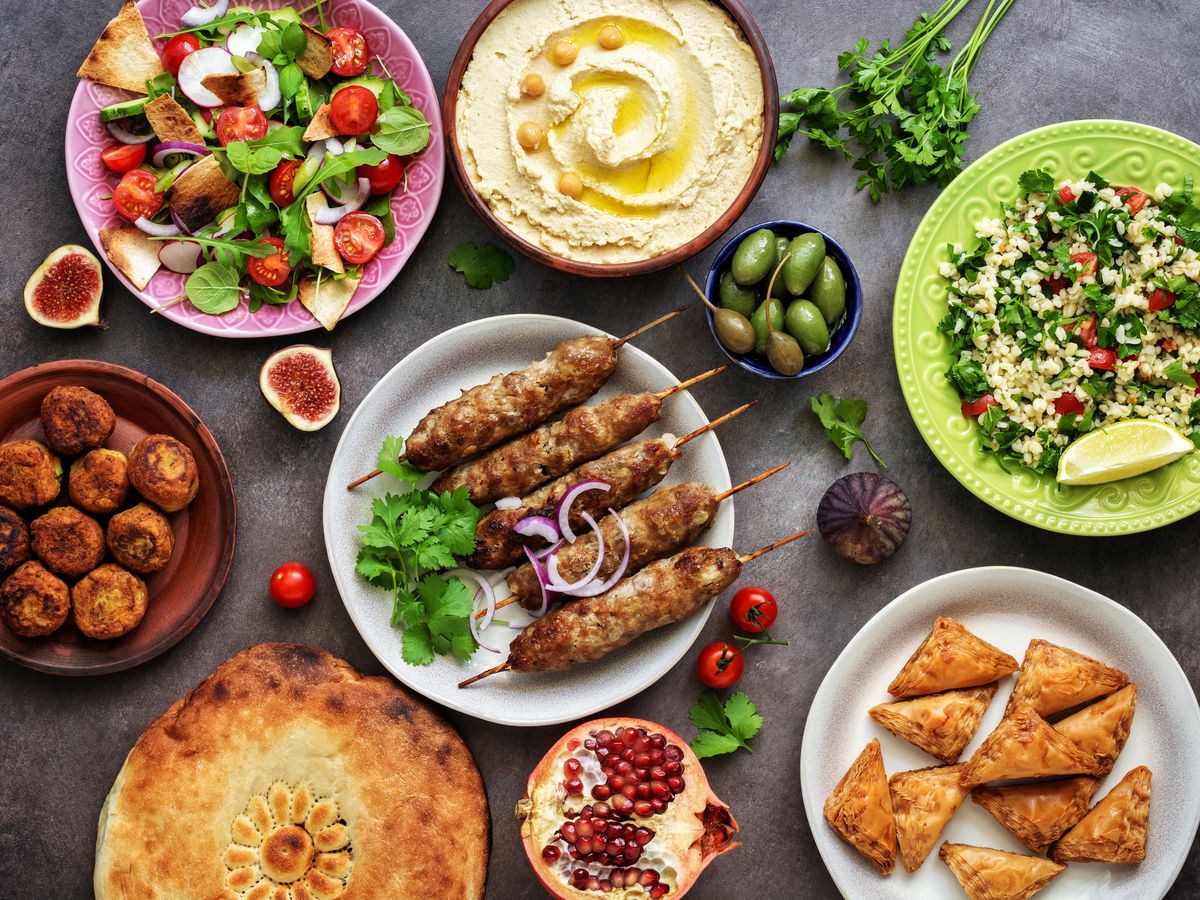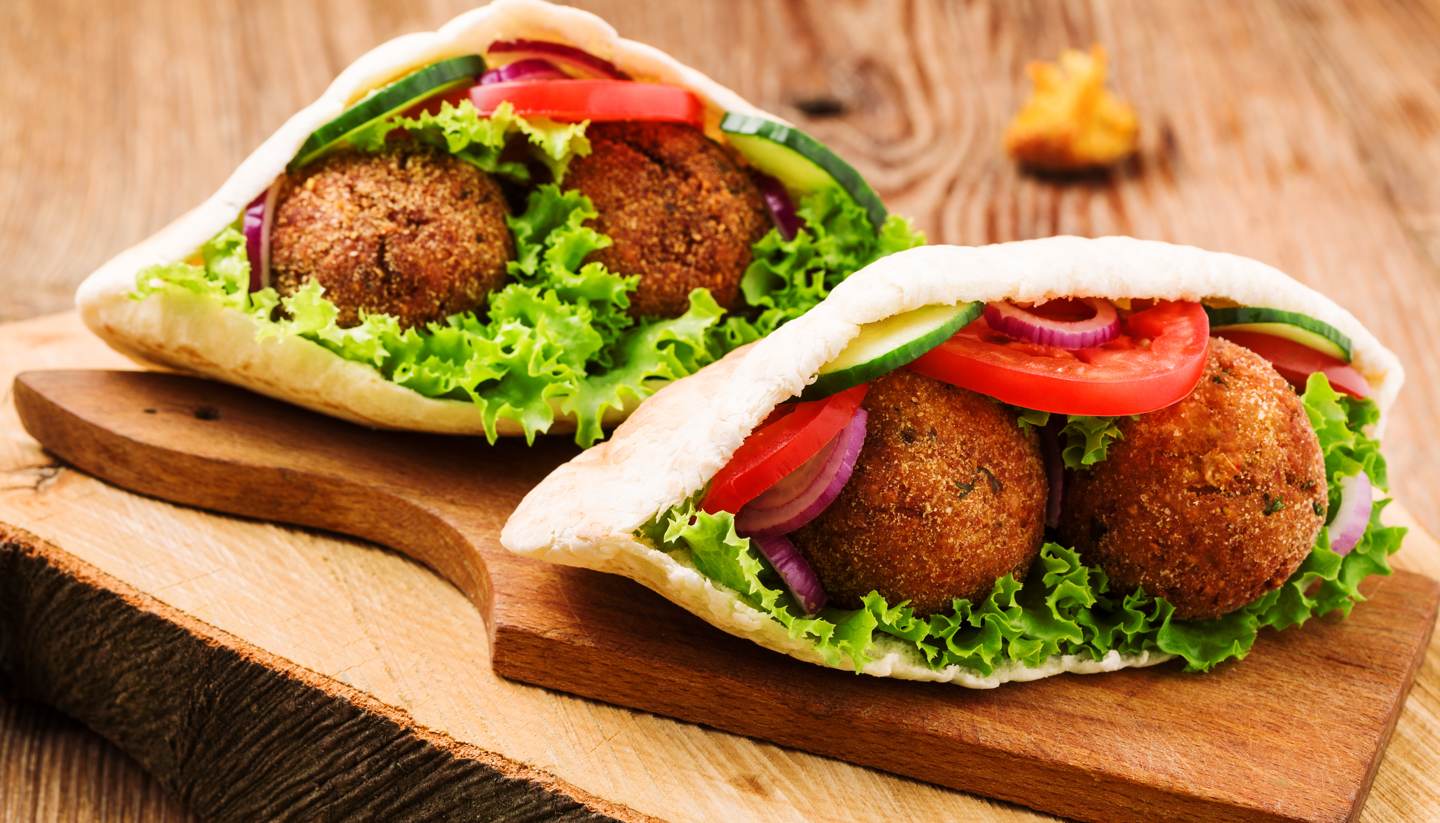Egyptian Food and Drink, A Culinary Journey
Egyptian food and drink offer a captivating journey through millennia of history and culture. From the simple yet nourishing staples that have sustained generations to the vibrant modern fusions reflecting global influences, Egyptian cuisine is a testament to the country’s rich heritage. This exploration delves into the heart of Egyptian culinary traditions, uncovering the stories behind iconic dishes and the significance of food in daily life and celebrations.
We’ll explore the essential ingredients, traditional cooking methods, and the cultural context surrounding meals. We’ll uncover the secrets behind dishes like kushari and ful medames, and discover the refreshing tastes of hibiscus tea and sugarcane juice. We’ll also look at how globalization has shaped modern Egyptian cuisine, leading to exciting new culinary creations. Get ready for a delicious adventure!
A Culinary Journey Through Egypt: Food and Drink Traditions: Egyptian Food And Drink
Egyptian cuisine, a vibrant tapestry woven from centuries of history and cultural exchange, offers a captivating culinary experience. Its evolution reflects the country’s rich past, influenced by diverse civilizations and trading routes. From the ancient pharaohs to modern-day Egypt, food has played a central role in daily life, celebrations, and social gatherings.
Introduction to Egyptian Cuisine: A Historical Perspective

Egyptian food’s history stretches back millennia. Ancient Egyptians relied heavily on the Nile River for sustenance, cultivating grains like wheat and barley, and raising livestock. The introduction of new ingredients and techniques by conquering empires, including the Greeks, Romans, and Ottomans, significantly shaped the nation’s culinary landscape. The influence of these cultures, along with the country’s strategic location, led to a unique blend of flavors and cooking methods.
The significance of food in Egyptian culture is profound. Shared meals are integral to family life and social interactions, representing hospitality, togetherness, and celebration. Food is often used to mark significant events and holidays, with specific dishes holding cultural and symbolic meaning.
Staple Foods of Egypt: The Foundation of the Diet

Egyptian cuisine relies on a foundation of readily available and nutritious ingredients. Wheat, barley, lentils, chickpeas, and fava beans are cornerstones of the diet. These ingredients form the basis of many traditional dishes, reflecting the country’s agricultural heritage. Fresh vegetables, fruits, and herbs, abundant throughout the year, add freshness and vibrancy to the cuisine.
Aish Baladi, the quintessential Egyptian bread, is prepared using a simple yet effective method. Wheat flour is mixed with water and yeast, then kneaded and left to rise. The dough is then baked in a traditional clay oven, resulting in a crusty and slightly chewy bread that is a staple at every meal. Its nutritional value lies in its provision of essential carbohydrates and fiber.
Popular Egyptian Dishes: A Culinary Sampler
Egyptian cuisine boasts a diverse range of dishes, each with its unique flavor profile and regional variations. Here are ten popular examples:
- Kushari: A hearty mix of rice, lentils, macaroni, chickpeas, and a spicy tomato sauce, topped with fried onions and garlic vinegar.
- Molokhia: A hearty stew made with jute leaves, often cooked with chicken or rabbit, and seasoned with garlic and coriander.
- Ful Medames: A flavorful fava bean stew, typically seasoned with lemon juice, olive oil, and cumin.
- Kofta: Ground meat (beef, lamb, or a mixture) seasoned with herbs and spices, often grilled or baked.
- Hawawshi: A savory flatbread filled with spiced minced meat.
- Mahshi: Stuffed vegetables (vine leaves, peppers, or zucchini) filled with rice and herbs.
- Ta’amiya (Falafel): Deep-fried chickpea patties, often served in pita bread with tahini sauce.
- Baba Ghanoush: A creamy dip made from roasted eggplant, tahini, lemon juice, and garlic.
- Shawarma: Thinly sliced marinated meat (usually lamb or chicken) cooked on a vertical rotisserie, served in pita bread with various toppings.
- Kunafa: A sweet pastry made with shredded phyllo dough, filled with cheese or nuts, and soaked in sweet syrup.
Regional variations often involve slight adjustments to the spice blend, the type of meat used, or the addition of local ingredients. For example, Molokhia recipes vary across different regions, reflecting local preferences and the availability of specific ingredients.
Simple Recipe: Ful Medames
- Rinse one cup of dried fava beans and soak them in water overnight.
- Drain the beans and place them in a pot with plenty of fresh water. Bring to a boil, then reduce heat and simmer for about 1-1.5 hours, or until tender.
- Mash the beans slightly with a fork or potato masher. Add 2 tablespoons of olive oil, 1 tablespoon of lemon juice, 1 teaspoon of cumin, salt, and pepper to taste.
- Simmer for another 10-15 minutes, stirring occasionally, to allow the flavors to meld.
- Serve hot with bread, and optionally, a sprinkle of chopped parsley or a drizzle of more olive oil.
Egyptian Drinks and Beverages: Quenching Thirst and Satisfying the Soul
Egypt offers a diverse range of traditional non-alcoholic beverages. Hibiscus tea (Karkadeh), a refreshing and slightly tart beverage, is a popular choice, especially during the hot summer months. Other common drinks include sugarcane juice, tamarind juice, and various fruit juices.
Tea and coffee hold significant cultural importance in Egypt. Strong, sweet tea is a staple beverage, served throughout the day and often shared during social gatherings. Coffee is also widely consumed, frequently prepared in traditional ways and enjoyed in cafes and homes.
Modern Egyptian Food Trends: A Fusion of Flavors
Globalization has undeniably impacted Egyptian cuisine, introducing new ingredients and culinary techniques. Fusion dishes, blending Egyptian flavors with international influences, have become increasingly popular. For example, you might find Egyptian-inspired pasta dishes or pizzas incorporating local spices and ingredients.
Gut health is super important, and a great way to support it is by incorporating plenty of probiotic foods and drinks into your diet. Check out this helpful resource on probiotic foods and drinks to learn more about boosting your gut bacteria. However, if you’re struggling with constipation, you might also want to explore the best food and drink for constipation to help get things moving smoothly.
Maintaining a balanced diet is key for overall wellness!
Modern Egyptian restaurants and street food vendors showcase both traditional and innovative approaches. Many establishments offer updated versions of classic dishes, alongside entirely new creations that reflect the evolving tastes of the younger generation.
A Day in the Life: Egyptian Food Experiences
A typical day of eating in Egypt might start with a simple breakfast of bread, cheese, and tea. Lunch often consists of a hearty meal, perhaps Ful Medames or Kushari, enjoyed at home or at a local eatery. Dinner is usually a more substantial affair, with a variety of dishes shared among family and friends. This might include meat dishes, salads, and rice, all accompanied by Aish Baladi.
Social context plays a vital role in Egyptian eating habits. Family meals are central to daily life, providing an opportunity for bonding and sharing. Celebrations and special occasions often feature elaborate feasts, with specific dishes prepared to mark the event. A food tour of Egypt could include visits to bustling markets, traditional restaurants, and street food stalls, offering a chance to sample a wide range of culinary delights.
Egyptian Food and Drink Festivals and Events: Celebrating Culinary Heritage
Egypt hosts several food-related festivals and events throughout the year. These celebrations showcase the country’s culinary diversity and offer opportunities for both locals and tourists to enjoy traditional dishes and participate in culinary competitions. These festivals often contribute significantly to the Egyptian tourism industry, attracting visitors interested in experiencing the nation’s unique food culture.
Maintaining a healthy gut is super important, and a great way to do that is by incorporating plenty of probiotic foods and drinks into your diet. These can help with digestion and overall well-being. However, if you’re struggling with constipation, you might need a more targeted approach. Check out this helpful guide on best food and drink for constipation to find relief and get things moving smoothly again.
A balanced diet, rich in fiber and probiotics, is key to a happy and healthy gut!
Preserving Traditional Egyptian Food: Safeguarding Culinary Heritage
Efforts are underway to document and preserve traditional Egyptian recipes and cooking methods. These initiatives aim to ensure that future generations can continue to enjoy and appreciate the country’s rich culinary heritage. Organizations and individuals are working to collect recipes, teach traditional cooking techniques, and promote the use of local ingredients.
The Future of Egyptian Food: Innovation and Growth
The future of Egyptian food likely involves a blend of tradition and innovation. The country’s culinary scene is dynamic, with a growing interest in both preserving traditional dishes and experimenting with new flavors and techniques. The Egyptian food industry has significant potential for growth, particularly in the areas of tourism and exports. The fusion of traditional recipes with modern culinary approaches is likely to be a defining feature of Egyptian cuisine in the coming decades.
From the ancient grains that formed the basis of early Egyptian diets to the innovative fusion dishes appearing in modern restaurants, Egyptian food and drink tell a compelling story of adaptation and cultural exchange. The vibrant flavors and rich traditions surrounding food in Egypt offer a unique and rewarding experience for both the palate and the soul. Whether you’re planning a trip to Egypt or simply curious about its culinary heritage, exploring its diverse cuisine is a journey worth taking.
Share this content:
